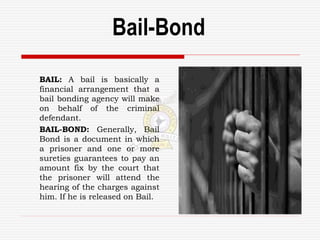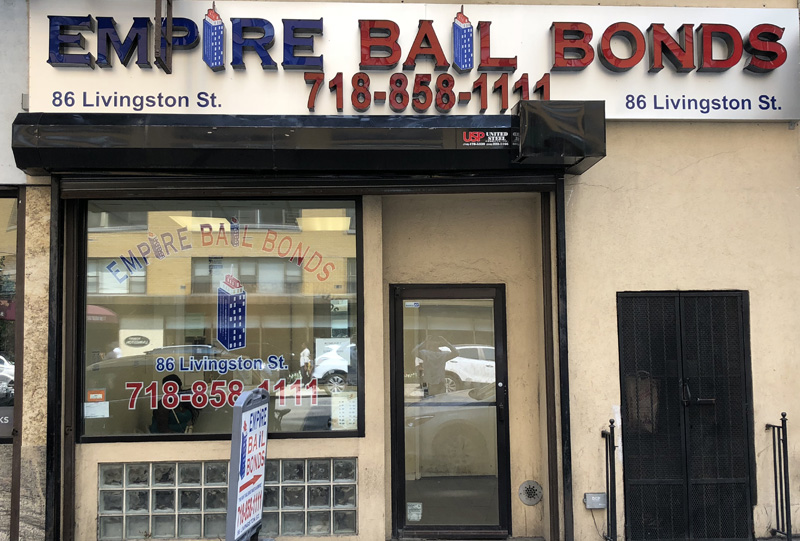Dayton Bail Bonds Provider - Expert and Confidential
Dayton Bail Bonds Provider - Expert and Confidential
Blog Article
Unlocking the Tricks of Bail Bonds: A Thorough Overview
Navigating the elaborate world of Bail bonds can often feel like analyzing a puzzling code, with layers of complexity that continue to be hidden to lots of. From the different types of Bail bonds available to the pivotal role of a co-signer, each element plays an essential part in this legal procedure.
Understanding Bail Bonds Process
When facing a lawful situation that requires publishing Bail, recognizing the Bail bonds process is critical to navigate the intricacies of the judicial system effectively. Bail bonds work as a financial warranty to the court that the accused will appear for all required court looks. This procedure includes a bail bondsman, who normally bills a non-refundable cost, usually around 10% of the overall Bail quantity, to post the Bail in support of the defendant.

Furthermore, security, such as property or assets, may be called for to secure the bail bond. Understanding the terms of the bail bond contract is important to make certain compliance and stay clear of any type of added lawful repercussions. By understanding the Bail bonds procedure, individuals can make informed decisions when navigating the legal system.
Sorts Of Bail Bonds Available
Different sorts of Bail bonds are readily available to individuals facing lawful proceedings, supplying options customized to particular conditions and demands. One of the most usual kind is a guaranty bond, where a bond bondsman pays the full Bail amount on part of the defendant in exchange for a non-refundable charge, usually around 10% of the total Bail. Cash bonds require the complete Bail amount to be paid in cash money before the accused can be released. Building bonds, on the other hand, entail utilizing valuable properties like property as security for the Bail amount.
In addition, there are federal Bail bonds for cases entailing government fees and migration bonds for individuals apprehended by Migration and Traditions Enforcement (ICE) Recognizance, or trademark bonds, are approved based upon the offender's assurance to appear in court without requiring any payment. Finally, transfer bonds are made use of when a defendant is apprehended in a various state and requires to publish Bail to be launched. Comprehending the various sorts of Bail bonds offered can aid offenders navigate the lawful process extra properly.
Obligations of the Co-Signer

Additionally, as a co-signer, you are liable for making certain that the offender adheres to any kind of problems established by the court, such as attending counseling or refraining from particular activities. It is very important to maintain open interaction with the offender to monitor their compliance and deal with any problems quickly. Inevitably, being a co-signer entails a considerable level of trust and duty, as you are economically and legally connected to the defendant's Bail commitments.
Repercussions of Missing Bail

Skipping Bail can have serious legal repercussions for both the offender and the co-signer associated with the bail bond arrangement. When an offender fails to appear in court as called for after publishing Bail, the court typically issues resource a warrant for their apprehension. This not only aggravates the accused's lawful problems yet click for info additionally places the co-signer in danger.
For the defendant, avoiding Bail can lead to added criminal costs, such as contempt of court or Bail jumping, which can result in fines, a retraction of Bail privileges, or perhaps jail time. Furthermore, the accused might shed the Bail quantity paid and any type of security given.
Co-signers also face substantial effects if the defendant avoids Bail. As the co-signer assures the defendant's appearance in court and is economically responsible for the full Bail quantity, they may be needed to pay the entire Bail if the accused absconds. This can result in monetary stress, harmed debt, and potential lawsuit versus the co-signer.
Trick Consider Bail Bond Approval
Much more serious offenses might lead to greater Bail amounts or even a denial of Bail entirely. A history of previous sentences or a pattern of skipping court days can increase red flags and make it more difficult to protect a bail bond.
Additionally, the connections the accused needs to the neighborhood can impact the approval of a bail bond. Solid neighborhood ties, such as steady work, family members links, and lasting residency, can work in favor of the defendant. On the other hand, trip danger worries might emerge if the offender has no strong links to the community. Funds also play a significant duty. The capability to pay the Bail quantity or give collateral can raise the chances of bail bond authorization. Eventually, a combination of these variables is weighed by the court when establishing whether to accept a bail bond.
Conclusion
In conclusion, understanding the Bail bonds process, the types offered, the duties of the co-signer, the repercussions of missing Bail, and the crucial consider bail bond approval are essential for navigating the legal system. By familiarizing oneself with these facets, individuals can make informed decisions and make certain a smoother process when dealing with Bail bonds. It is important to comply with the requirements and guidelines established forth to avoid any kind of potential problems.
The most typical type is a guaranty bond, where a bond bondsman pays the complete Bail quantity on behalf of Going Here the defendant in exchange for a non-refundable charge, normally around 10% of the overall Bail. By authorizing the bail bond agreement, you are taking on the obligation of assuring the full Bail amount if the accused falls short to show up in court - bail bond company dayton ohio.Avoiding Bail can have significant legal repercussions for both the co-signer and the defendant involved in the bail bond agreement. The ability to pay the Bail quantity or give collateral can raise the possibilities of bail bond approval.In final thought, recognizing the Bail bonds process, the kinds readily available, the duties of the co-signer, the consequences of avoiding Bail, and the key aspects in bail bond authorization are crucial for navigating the legal system
Report this page